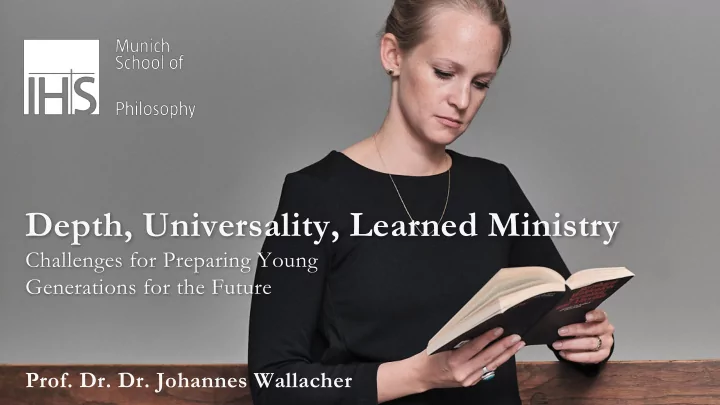

Depth, Universality, Learned Ministry Challenges for Preparing Young Generations for the Future Prof. Dr. Dr. Johannes Wallacher
Educational and Training Challenges: Preparing Young Generations for the Future Guiding principles for transforming higher education and stimulating pedagogical science and practice: Thinking Openly, Discovery of the Absolute, Solidarity and Fraternity Depth, Universality, Learned Ministry
http://www.news.un.org/
Reframing Economic Theory Broadening the neo-classical concept of economics: „ Economics is the science which studies human behavior as a relationship between ends and scarce means which have alternative uses“ (Lionel C. Robbins 1931) SDG 12: Responsible Consumption and Production Questioning the supply-side dominance of neoclassical production theory (assumption of insatiable needs/desires of consumers)
Reframing Economic Theory Broadening the simple concept of human well-being: land, labour and capital → income → goods and services → → personal well-being SDG 9: Industry, Innovation and Infrastructure Questioning the growth of gross domestic product as single paradigm for economic development and well-being.
Alternative Theories (“Narratives”) of Personal Well-Being Enhancing “capabilities” (Amartya Sen ) Preference Formation Personal Contexts : Mechanism • Social Institutions history and • Social and legal norms psychology Social Influences on • Other people‘s behaviors Decision Making and characteristics • Environmental factors and many, many more Capability Set Non-market production Individual Market production Achieved Goods and Choice Conversion Fundctions Services Capabilities Net income Factors (i.e. opportunity set of Transfers-in-kind achievable functionings) Means to achieve Freedom to achieve Achievement (capability inputs)
Reframing Economic Theory Broadening the simple concept of common goods: “Social Dilemma Structure” of Common goods: “Prisoner’s dilemma” based on rational choice model with “Avoiding Bad” as main strategy (Conditioned) Cooperation for establishing/preserving Common goods: “Social tipping dynamics” for Transformation; “Change actors” who strive for good (transformative consumption, production, finance)
The Crucial Role of Common Goods Social Natural • Trust (wrt free-riding) • Land • Roads (if congested) Sub-Global • Air • Public Transport (congested) • Freshwater • Other networks (if congested) • Coastal fisheries • Schools (if congested) • Natural amenities • Hospitals (if congested) • Atmosphere (GHG & ODS sink) • Trust (wrt free-riding) • Oceans (minerals, fish etc, sinks) Global • Peace and Security • Rain Forests (biodiversity, GHG sink) • Knowledge, Technology • Land (global food & biomass) • Global infrastructure , e.g. Internet • Freshwater (global food & biomass)
Common, but Differentiated Responsibilities: Global Governance UN-Organisations International Regimes Regional, but Supranatioal Cooperations e.g. EU, AU, NAFTA Nation States Local Politics Private Global Players Civil Societies national & global • • Transnational Corporations Non-Governmental • International Financial Organisations • System Religions and Churches • • Media Sciences
Recommend
More recommend